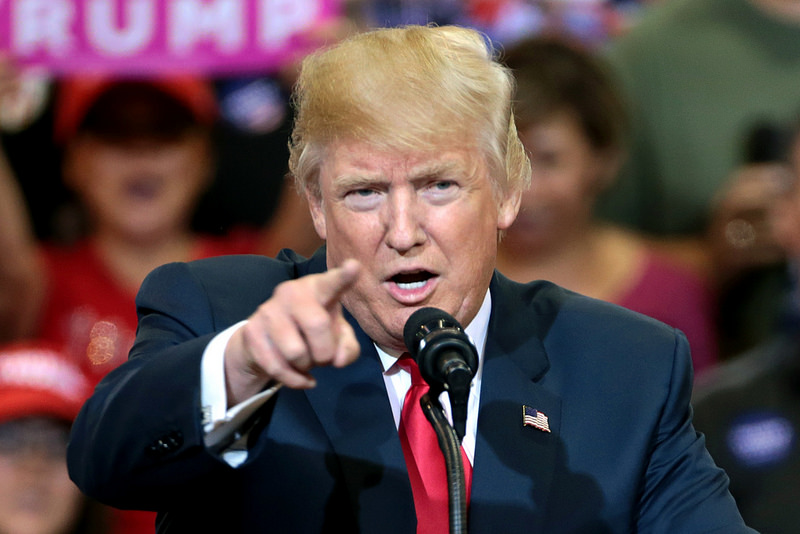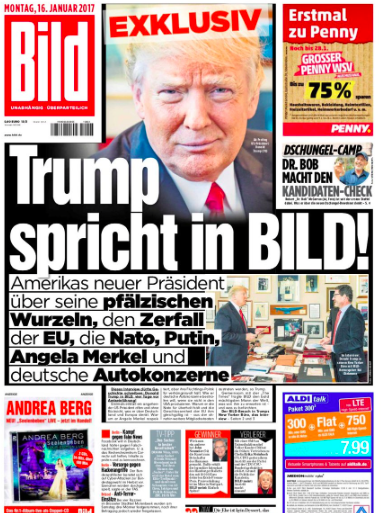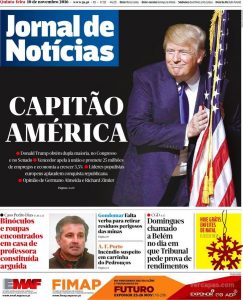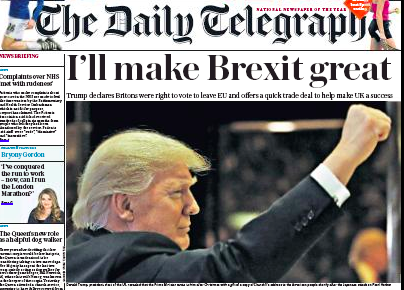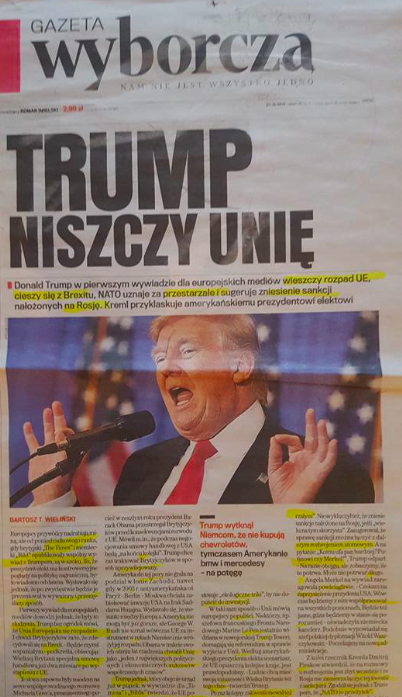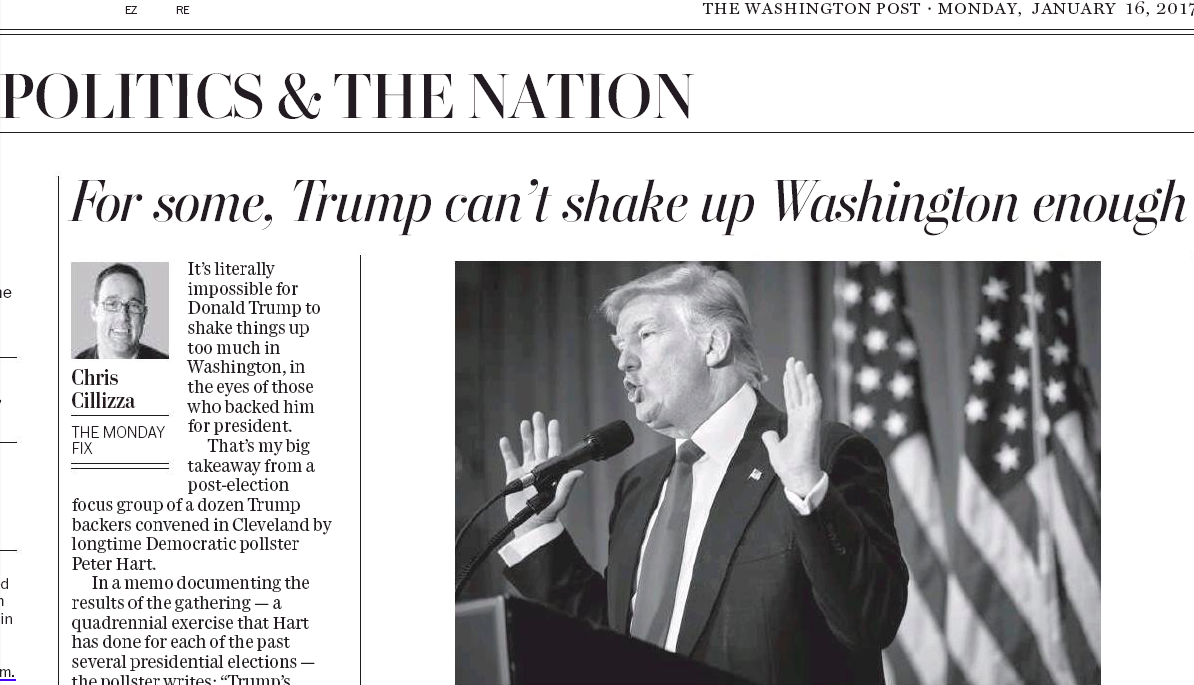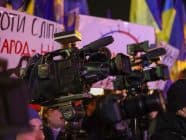As Donald J. Trump becomes the 45th president of the United States of America, he is greeted by assessments of the European media that portray him as an unpredictable commander-in-chief, a reckless world leader and, by some, a buffoon with irritating manners. News commentators from the United Kingdom to Ukraine and from Portugal to Poland are worried that Trump will undermine transatlantic relations, weaken the European Union and make deals with Vladimir Putin at the expense of smaller countries in Central and Eastern Europe. A systematic analysis by the European Journalism Observatory reveals a level of trepidation and concern towards the incoming American president that is probably unparalleled in recent history.
“The biggest political experiment since the end of the Cold War…”
Pessimistic views are only balanced by the optimistic voices of Brexit-supporters, major tabloids such as the German Bild and a few conservative news outlets across the continent. Kai Diekmann, the publisher of Bild, commented: “Trump has been the biggest political experiment since the end of the Cold War. Trump says things which are actually unthinkable in diplomacy. He is rude, he is insulting – and he is painfully honest. This can lead to conflicts but also break open crusted conflicts.” Also some pro-Russian media in Eastern European countries played down the threats of a Trump presidency and showed sympathies for Trump as a strong man in the White House.
But more commonly, European media were wary of the Trump presidency. As Jonathan Freedland wrote in the Guardian, “no one has the first clue how to handle what’s coming. Politicians, journalists and diplomats, in the US and around the world, are searching for guidance, desperately flicking through the pages of the rulebook, a manual full of past precedents and norms that they have spent their careers mastering – but that Trump burned and shredded months ago.”
The European Journalism Observatory conducted a qualitative content analysis of the print editions of three daily newspapers in each of 10 European countries and also in the United States, between January 12 and January 18. Hundreds of articles were examined in newspapers representing a broad spectrum of political opinion. Countries included EU members and non-members: Austria, Czech Republic, Germany, Italy, Latvia, Poland, Portugal, Romania, Ukraine and the United Kingdom. To add an American perspective, a related study examined how three major American newspapers analysed Trump’s impact on Europe.
“Europe’s nightmare”
During the week before his inauguration, Donald Trump not only dominated the reporting of European newspapers, he also set the agenda about specific issues. First came his initial press conference as a president elect in which he said: “Russia will have much greater respect for our country when I’m leading it than when other people have led it.” Then an interview with The Times, London, and Bild sent shockwaves through the continent after Trump declared NATO “obsolete” and the European Union bound for disintegration. “Europe’s nightmare” was a headline in the German newspaper Süddeutsche Zeitung. “Trump ruins the European Union,” said the front page of the Polish Gazeta Wyborcza. And a commentator in the Italian Corriere della Sera wrote: “Europe could be the first victim of Trump.”
European media were virtually unanimous in their assessment that an alliance between Trump and Putin will have harmful consequences for Europe. “If Trump succeeds in accomplishing his Russian policy,” wrote the Portuguese quality newspaper Público, “the first ‘casualty’ will be Europe: it will be marginalised. It will drift apart.” Not surprisingly, Trump’s potential rapprochement with Russia particularly alarmed news media in Central and Eastern Europe. A “deal with Putin won’t bring peace (…) it makes war even likelier,” wrote the leading Latvian quality newspaper Latvijas Avize.
Despite striking similarities in the negative (or, at best, neutral) tone of the media coverage, some news outlets expressed cautious optimism that a Trump presidency might actually yield positive outcomes, especially for the economy. According to some analyses in Austrian newspapers, stock markets might react favourably to Trump’s promises of reducing taxes and curbing the bureaucracy. Some German commentators expressed hopes for Trump’s deal-making skills. And across the board, news commentators also emphasised alternatives to letting Trump dictate the rules of engagement. Suggestions ranged from a stronger focus on European unity to recommendations for realpolitik. Allister Heath, writing in the UK’s conservative Telegraph, said that “to shun the (Trump) administration would be a catastrophic error.”
Surprisingly, few media focused on the potential implications of a Trump presidency on their own nation’s outlook. Domestic issues such as the rise of the right populism and similarities between Europe and the US with regard to a general disillusionment with political elites received little coverage in the seven days covered by the study. Nevertheless, some commentators highlighted potential connections. “After the victory of Brexit supporters and Donald Trump, it seems as anything can happen in the West. In this context, the scenario of Marine Le Pen winning the [2017] presidential election and a subsequent French referendum on leaving the European Union does not look like a figment of a lunatic,” wrote the biggest Czech daily Mladá fronta Dnes.
Leading newspapers in the US initially paid little attention to transatlantic relations. But after Trump’s negative comments about the EU and NATO, they expressed concern about the new President’s priorities. The New York Times chided Trump in an editorial saying “to cavalierly dismiss as unimportant the idea of European integration and the second-largest market in the world is to ignore history and reject the future.” An editorial in the Washington Post urged Trump’s cabinet members to prevent their commander in chief from acting on his fiery rhetoric against European integration and NATO. “Once destroyed,” the editorial said, “the West’s alliances will not be easily rebuilt.”
The following is a brief summary of media coverage in each of the eleven countries participating in the study.
Western Europe
Portugal
The Portuguese news media’s coverage of events leading up to the inauguration mostly in a neutral way, with little commentary or analysis. Coverage focused on issues like the relationship between the US and Russia (including the possibility of lifting US sanctions against Russia), Trump’s criticism of Europe with regard to the refugee crisis and the dominance of the German economy. Only one story focused on bilateral relations between Portugal and the US. The Portuguese Secretary of State of Foreign Affairs and Cooperation was quoted saying that she awaited the Trump administration “with tranquility” and that she believed in a good bilateral relationship. Potentially contentious topics, such as the US military base on the Azores, were not discussed in any of the papers studied. But concern was expressed regarding Trump’s rapprochement with Russia. Público asserted: “If Trump succeeds in accomplishing his Russian policy, the first “casualty ” will be Europe: it will be marginalised. It will tend to divide.”
United Kingdom
British newspapers await the Trump presidency with a mixture of trepidation and incredulity. Headlines such as, “We are right to be afraid as Trump takes office”(Observer) and “Forget sex. It’s Trump’s taste for roubles that could destroy his Presidency” (Mail), indicated that newspapers across the political spectrum shared similar views about the new American president. After Trump’s press conference, articles were largely scathing, as though American politics had descended into farce, indicating generally low expectations about the next four years of US politics. Coverage in the Mail and Telegraph, the two right-wing, pro-Brexit newspapers in the study, became slightly more positive after Trump’s comments about trading with a post-Brexit UK. The Mail said it was a “huge boost for Britain”. The Guardian was sceptical, however: a headline on the same day declared: “A UK trade deal with Trump? Be careful what you wish for”.
Central Europe
Austria
Dominant issues in Austrian newspapers were Trump’s relationship with Russia, his view on the European Union and NATO as well as his influence on the world economy – and European markets in particular. Very few of the articles contained direct references to Austria. The coverage displayed considerable uncertainty about how to handle the president-elect. “And still nobody knows what his presidency will bring,” wrote Der Standard. “The more he tweets, the less clarity.” Many commentators expressed scepticism as well as fear of what’s ahead politically. According to the Krone, Trump’s statements in his interview with European media were “a sweeping blow which could turn the world upside down”. At the same time, some commentators greeted the economic initiatives of the Trump administration with cautious hope.
Germany
Pre-inauguration coverage in Germany was dominated by Trump’s exclusive interview with the tabloid Bild, Trump’s attack on Angela Merkel and the repercussion for the German economy. Bild presented the interview in a splashy display of photos. The interview headline was: “What is typically German about me? I like order!” Conservative FAZ, while sceptical in much of its Trump coverage, also noted that Trump seemed to act like a CEO for the United States of America who, by brokering deals, wanted to get the most out for his country. “Trump’s frankness is irritating and refreshing at the same time”, the author wrote. The left-leaning Süddeutsche expected that the Trump presidency will mark a new beginning of US-German-relationship, and not in a good way. “Trump Questions Postwar Order,” read one headline and a cartoon shows Merkel losing against Trump in a boxing match. The German press also expressed fears about the rising re-nationalisation across the whole continent, the dissolution of the EU, repercussions on relations with the US and that Trump would not care about Europe at all.
Italy
Italian newspapers covered Trump quite extensively in the analysed timeframe, especially his first press conference and the sex allegations. The papers studied had a strong combination of opinion and facts-based stories. The Trump-related coverage mainly focused on implications for Europe, especially in light of the closer ties with Russia. “Europe could be the first victim of Trump,” commented Corriere della Sera. Corriere della Sera went on to say that Trump’s relationship with Russia could “leave Europe uncovered in a weak position to make agreements with Russia under Russian conditions”. While transatlantic issues were discussed as well, implications for Italy were only rarely debated. La Repubblica published an op-ed by Francesco Merlo comparing Trump and Berlusconi, but it mainly focused on their sex scandals, rather than on the political implications for Italy. Right-wing Il Giornale was less critical about Trump’s attitudes towards Vladimir Putin and expressed hope that better connections with Russia might be beneficial.
Eastern Europe
Czech Republic
Czech media wrote extensively about Trump in the week before inauguration and overall the tone of coverage was neutral. Nevertheless there was uncertainty. The economic daily Hospodářské noviny wrote: “Donald Trump will finish his inauguration saying the famous phrase ‘so help me God.’ (…) Many might think ‘let God rather help America and the whole world.’” The majority of articles dealt with transatlantic issues between Europe and the US, expressing an intense feeling of insecurity, in both economic and political matters. For the Czech media, Trump’s views on climate change augur a growing threat of environment decay and his approach to foreign affairs a greater isolationism of the United States. The papers expressed concerns about nationalism in Europe and populism worldwide, with negative consequences for Western democracies and stronger economic and political roles for China and Russian.
Poland
Polish media were framing Trump’s criticism of NATO and the EU as a direct challenge and a threat for Poland. They worried about the effects of a Trump presidency on the stability in Central Eastern Europe. The tone of coverage turned markedly more negative after the Trump interview with European media. “US allies are terrified!” read a headline in the tabloid Fakt. “New President can do anything. Is Poland safe?” Trump’s rapprochement with Vladimir Putin and Russia was widely discussed and treated with trepidation. “Clearly and truly,” wrote the conservative Rzeczpospolita, Trump “is going to disassemble the Western world in order to make deals with Vladimir Putin.” The liberal-left Gazeta Wyborcza was particularly obsessed with the role of Russia, wondering how much “dirt” Putin’s administration may have on Trump.
Romania
Romanian news platforms were less focused on the implications of a Trump presidency for Romania and more concerned with international relations, with a special emphasis on Russia, China and Germany. Given the potential fallout in this arena, the outlook for the Trump presidency was either negative or neutral in tone. The online news platform hotnews.ro discussed potential American strategies for dealing with Russia and economic repercussions for Germany. The quality news platform adevarul.ro devoted ample space to examining the opposition of many American artists towards the president-elect. Consequences for the general situation in Europe were not featured prominently. For example, the most popular online website of the ProTV newsroom just mentioned Trump’s statement that Brexit will be “a success” and that he plans to sign a trade agreement with the United Kingdom. The tabloid Libertatea gave Trump the tabloid treatment: it highlighted his affairs and even hinted at a potential Romanian mistress.
Baltic states and Ukraine
Latvia
Latvian media outlets were mainly concerned with possible links between Trump and Russia, their effects on transatlantic security and the unpredictable character of Trump’s leadership. Some characterisations of the Trump-Putin alliance (Latvijas Avīze): “deal with Putin shouldn’t undermine European security”, “deal with Putin won’t bring peace… it makes war even likelier”, “it will undermine American credibility among allies in Europe and elsewhere.” In this context, there was also a clear editorial division between the conservative quality paper Latvijas Avīze and the Russian-language Vesti Segodnja. Latvijas Avīze conjured an image of Trump as a puppet in Russia’s hands while Vesti Segodnja portrayed Trump as neutral and disputed his friendly ties Putin. On other occasions Latvijas Avīze, because of its conservative stance, didn’t hide its sympathies for Trump and his populist style. Delfi.lv, the most popular news site in Latvia, had the most extensive coverage but steered away from taking a position on either side.
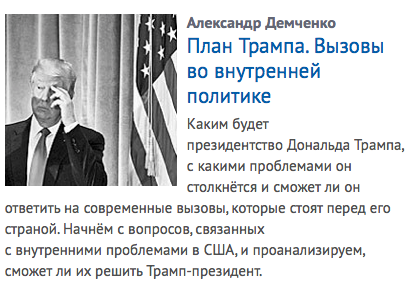 Ukraine
Ukraine
Media outlets in Ukraine also analysed the impact of the Trump presidency mostly in terms of Trump’s attitudes towards Russia. As the country’s media owners express strong political preferences and pro-Russian media still have a noticeable share of the audience, news outlets reflected divergent outlooks. The pro-Ukrainian papers were more neutral in tone but discussed concerns about Russian cyber attacks (Den). One of the most popular online outlets, LB.ua, chastised the Ukrainian elite for being unprepared for a Trump presidency and for the potential impact of the new administration’s influence on Ukrainian politics and on the conflict. The same author worried that “Trump can decide to reduce a part of the foundation that the Ukrainian state is based on, or even take this part out.” The popular pro-Russian newspaper Vesti showed sympathy for Trump and portrayed him as a strong man whose main interest is his country. As Ukraine is not a member of the EU, the Ukrainian media paid less attention to general European issues.
United States
News outlets in the United States weren’t paying much attention to the potential impact of the Trump presidency on Europe. Trump did not mention Europe in his first press conference as president-elect. But then his interview with The Times and Bild put European issues at centre stage. “European leaders shocked as Trump slams NATO and E.U., raising fears of transatlantic split,” read the headline of the Washington Post. The New York Times wrote: “As Trump Era Arrives, a Sense of Uncertainty Grips the World.” The tabloid New York Post reported, “Donald Trump will begin his presidency by putting German Chancellor Angela Merkel –an ally—on the same footing as adversary Vladimir Putin, the President-Elect revealed in a new interview.” The changing relationship with Russia was a dominant topic throughout the week leading up to the inauguration.
This article has also been published on EJO Portugal; EJO Romania; EJO Poland; EJO Latvia; EJO Ukraine; EJO Czech; EJO Germany; EJO Italy;
Newspapers analyzed:
Austria: Kronen Zeitung, Der Standard, Die Presse
Czech Republic: Blesk; Mladá fronta Dnes; Hospodářské noviny
Germany: Bild, Süddeutsche Zeitung, Frankfurter Allgemeine Zeitung
Italy: La Repubblica, Il Giornale and Corriere della Sera
Latvia: Latvijas Avīze, Vesti Segodņa, Delfi.lv
Poland: Gazeta Wyborcza, Rzeczpospolita, Fakt
Portugal: Público, Jornal de Notícias and Correio da Manhã
Romania: libertatea.ro, adevarul.ro, hotnews.ro, stirileprotv.ro
Ukraine: “Den” (“День”), “Vesti” (“Вести”), and “LB.UA”
UK: Guardian/Observer, Daily and Sunday Telegraph and Daily Mail/Mail on Sunday
US: The New York Times, The Washington Post and New York Post
About the project:
“Alarmed, Unsettled and Wary: European Media Ponder a Trump Presidency”
is part of an ongoing collaborative research project by the European Journalism Observatory.
Methodology:
The analysis was conducted at 11 universities and research institutes across Europe and the US. Researchers were asked to answer the following questions when analyzing news reports and comments.
QUESTION 1: What impact (immediate or long term) do newspapers expect from a Trump presidency on YOUR country? What opportunities and/or challenges do they predict with regard to bilateral relations with the United States? Is there any talk of a “Trump effect” in your country?
QUESTION 2: What consequences of a Trump presidency do newspapers identify for the situation in EUROPE in general? Do they make any predictions for the state of the European Union and/or upcoming elections in European countries? What are the main topics and themes (populism, immigration, economy, etc.) they are concerned about when it comes to analyzing the impact of a Trump presidency?
QUESTION 3: What consequences do newspapers expect or predict with regard to TRANSATLANTIC ISSUES and partnerships such as NATO, TTIP – Transatlantic Trade and Investment Partnership, etc.? If Russia is mentioned, how do newspapers characterize collaboration between the U.S. and Europe in light of Trump’s opening towards Vladimir Putin? What kinds of threats and concerns (political, economic, cultural, military) are mentioned?
The comparison of these individual research reports focused on identifying opinions, attitudes and predictions that, all taken together, represented themes and expectations towards the Trump administration and its impact on Europe.
EJO network:
Written by:
Thomas R. Schmidt, University of Oregon
Contributors:
Tobias Eberwein, Institute for Comparative Media and Communication Studies, Austrian Academy of Sciences, Alpen-Adria-Universität
Sandra Stefanikova, Martina Topinkova, Charles University Prague, Czech EJO
Tina Bettels-Schwabbauer, Gordon Wüllner, Erich-Brost-Institut TU Dortmund, German EJO
Philip Di Salvo, Università della Svizzera italiana, Lugano, EJO Italy
Liga Ozolina, Turiba University, Riga, EJO Latvia
Adam Szynol, Michał Kuś, Wroclaw University, EJO Poland
Ana Pinto Martinho, Décio Telo, ISCTE – University Institute of Lisbon, EJO Portugal
Raluca Radu, Antonia Matei, Anamaria Neagu, Marian Popovici & Oscar Stănciulescu, University of Bucharest, EJO Romania
Halyna Budivska, National University of “Kyiv-Mohyla Academy”, Kiev, EJO Ukraine
Caroline Lees, Reuters Institute for the Study of Journalism, University of Oxford
Scott Maier, University of Oregon
Main picture credit: Gage Skidmore, Flickr CC licence
Tags: Bild, climate change, Donald Trump, Eu, European Media, Guardian, inauguration, Journalism, Mail, NATO, Observer, Putin, RISJ, Russia, Telegraph, The Times, US Presidential election

